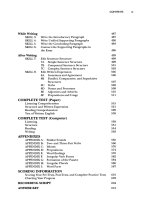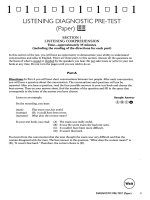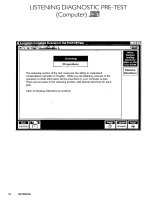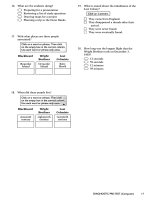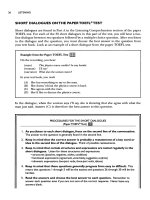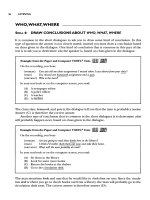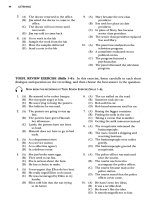The LearningExpress Test Preparation System
Bạn đang xem bản rút gọn của tài liệu. Xem và tải ngay bản đầy đủ của tài liệu tại đây (124.33 KB, 16 trang )
F
ACT: Taking the THEA is not easy, and neither is getting ready for it. Your future depends on your
getting a passing score, but there are all sorts of pitfalls that can keep you from doing your best on
this exam. Here are some of the obstacles that can stand in the way of your success:
■
being unfamiliar with the format of the exam
■
being paralyzed by test anxiety
■
leaving your preparation to the last minute
■
not preparing at all!
■
not knowing vital test-taking skills: how to pace yourself through the exam, how to use the process of elimi-
nation, and when to guess
■
not being in tip-top mental and physical shape
■
messing up on test day by arriving late at the test site, having to work on an empty stomach, or shivering
through the exam because the room is cold
CHAPTER
The
LearningExpress
Test Preparation
System
CHAPTER SUMMARY
Taking the THEA can be tough. It demands a lot of preparation if you
want to achieve a top score. Your academic future depends on your
passing the exam. The LearningExpress Test Preparation System,
developed exclusively for LearningExpress by leading test experts,
gives you the discipline and attitude you need to be a winner.
2
7
What’s the common denominator in all these
test-taking pitfalls? One word: control. Who’s in con-
trol, you or the exam?
Here’s some good news: The LearningExpress
Test Preparation System puts you in control. In nine
easy-to-follow steps, you will learn everything you need
to know to make sure that you are in charge of your
preparation and your performance on the exam. Other
test-takers may let the test get the better of them;
other test-takers may be unprepared or out of shape,
but not you. You will have taken all the steps you need
to take to get a high score on the THEA.
Here’s how the LearningExpress Test Preparation
System works: Nine easy steps lead you through every-
thing you need to know and do to get ready to master
your exam. Each of the steps listed below includes both
reading about the step and one or more activities. It’s
important that you do the activities along with the
reading, or you won’t be getting the full benefit of the
system. Each step tells you approximately how much
time that step will take you to complete.
Step 1. Get Information 50 minutes
Step 2. Conquer Test Anxiety 20 minutes
Step 3. Make a Plan 30 minutes
Step 4. Learn to Manage Your Time
10 minutes
Step 5. Learn to Use the Process of
Elimination 20 minutes
Step 6. Know When to Guess 20 minutes
Step 7. Reach Your Peak
Performance Zone 10 minutes
Step 8. Get Your Act Together 10 minutes
Step 9. Do It! 10 minutes
Total 3 hours
We estimate that working through the entire sys-
tem will take you approximately three hours, though it’s
perfectly OK if you work faster or slower. If you take an
afternoon or evening, you can work through the whole
LearningExpress Test Preparation System in one sitting.
Otherwise, you can break it up, and do just one or two
steps a day for the next several days. It’s up to you—
remember, you are in control.
Step 1: Get Information
Time to complete: 50 minutes
Activity: Read Chapter 1,“What Is the THEA?”
Knowledge is power. The first step in the Learning-
Express Test Preparation System is finding out every-
thing you can about the THEA. Once you have your
information, the next steps in the LearningExpress Test
Preparation System will show you what to do about it.
Part A: Straight Talk about the
THEA
Why should you have to go through a rigorous exam?
It is simply an attempt to be sure you have the knowl-
edge and skills necessary to succeed in school.
It is important for you to remember that your
score on the THEA does not determine how smart you
are or even whether you will make a good student.
There are all kinds of things an exam like this can’t test,
like whether you have the drive, determination, and
dedication to succeed. Those kinds of things are hard
to evaluate, while a test is easy to evaluate.
This is not to say that the exam is not important!
The knowledge tested on the exam is knowledge you
will need to succeed in college. Your ability to become
a college student depends on your passing this exam.
That’s why you are here—using the LearningExpress
Test Preparation System to achieve control over the
exam.
Part B: What’s on the Test
If you haven’t already done so, stop here and read
Chapter 1 of this book, which gives you an overview of
the exam. Then, go to the Internet and read the most
up-to-date information about your exam directly from
the test developers.
–
THE LEARNINGEXPRESS TEST PREPARATION SYSTEM
–
8
Step 2: Conquer Test Anxiety
Time to complete: 20 minutes
Activity: Take the Test Stress Test
Having complete information about the exam is the
first step in getting control of the exam. Next, you have
to overcome one of the biggest obstacles to test success:
test anxiety. Test anxiety not only impairs your per-
formance on the exam itself; but also keeps you from
preparing! In Step 2, you will learn stress management
techniques that will help you succeed on your exam.
Learn these strategies now, and practice them as you
work through the exams in this book, so they will be
second nature to you by exam day.
Combating Test Anxiety
The first thing you need to know is that a little test anx-
iety is a good thing. Everyone gets nervous before a big
exam—and if that nervousness motivates you to pre-
pare thoroughly, so much the better. It is said that Sir
Laurence Olivier, one of the foremost British actors of
the last century, felt ill before every performance. His
stage fright didn’t impair his performance; in fact, it
probably gave him a little extra edge—just the kind of
edge you need to do well, whether on a stage or in an
examination room.
At the bottom of the page is the Test Stress Test.
Stop and answer the questions, to find out whether
your level of test anxiety is something you should
worry about.
Your Test Stress Score
Here are the steps you should take, depending on your
score. If you scored:
Below 3, your level of test anxiety is nothing to
worry about; it’s probably just enough to
give you that little extra edge.
Between 3 and 6, your test anxiety may be
enough to impair your performance, and you
should practice the stress management tech-
niques listed in this section to try to bring
your test anxiety down to manageable levels.
–
THE LEARNINGEXPRESS TEST PREPARATION SYSTEM
–
Test Stress Test
You only need to worry about test anxiety if it is extreme enough to impair your performance. The following ques-
tionnaire will provide a diagnosis of your level of test anxiety. In the blank before each statement, write the num-
ber that most accurately describes your experience.
0 = Never 1 = Once or twice 2 = Sometimes 3 = Often
______ I have gotten so nervous before an exam that I simply put down the books and didn’t study
for it.
______ I have experienced disabling physical symptoms such as vomiting and severe headaches
because I was nervous about an exam.
______ I have simply not showed up for an exam because I was scared to take it.
______ I have experienced dizziness and disorientation while taking an exam.
______ I have had trouble filling in the little circles because my hands were shaking too hard.
______ I have failed an exam because I was too nervous to complete it.
______ Total: Add up the numbers in the blanks above.
9
Above 6, your level of test anxiety is a serious
concern. In addition to practicing the stress
management techniques listed in this
section, you may want to seek additional,
personal help. Talk to your guidance coun-
selor. Tell the counselor that you have a level
of test anxiety that sometimes keeps you
from being able to take an exam. The coun-
selor may be willing to help you or may sug-
gest someone else you should talk to.
Stress Management
Before the Test
If you feel your level of anxiety getting the best of you
in the weeks before the test, here is what you need to do
to bring the level down again:
Get prepared. There is nothing like knowing
what to expect and being prepared for it to
put you in control of test anxiety. That is
why you are reading this book. Use it faith-
fully, and remind yourself that you are better
prepared than most of the people taking
the test.
Practice self-confidence. A positive attitude is a
great way to combat test anxiety. This is no
time to be humble or shy. Stand in front of
the mirror and say to your reflection, “I am
prepared. I am full of self-confidence. I am
going to ace this test. I know I can do it.” Say
it into a tape recorder and play it back once a
day. If you hear it often enough, you will
believe it.
Fight negative messages. Every time someone
starts telling you how hard the exam is or
how it’s almost impossible to get a high
score, start telling them your self-confidence
messages above. Don’t listen to the negative
messages. Turn on your voice recorder and
listen to your self-confidence messages.
Visualize. Imagine yourself on your first day on
a university or college campus. Visualizing
success can help make it happen—and it
reminds you of why you are going to all this
work in preparing for the exam.
Exercise. Physical activity helps calm your body
down and focus your mind. Besides, being in
good physical shape can actually help you do
well on the exam. Go for a run, lift weights,
go swimming—and do it regularly.
Stress Management on Test Day
There are several ways you can bring down your level
of test anxiety on test day. They will work best if you
practice them in the weeks before the test, so you know
which ones work best for you.
Deep breathing. Take a deep breath while you
count to five. Hold it for a count of one, then
let it out on a count of five. Repeat several
times.
Move your body. Try rolling your head in a cir-
cle. Rotate your shoulders. Shake your hands
from the wrist. Many people find these
movements very relaxing.
Visualize again. Think of the place where you
are most relaxed: lying on the beach in the
sun, walking through the park, or whatever.
Now close your eyes and imagine you are
actually there. If you practice in advance, you
will find that you only need a few seconds of
this exercise to experience a significant
increase in your sense of well-being.
When anxiety threatens to overwhelm you right
there during the exam, there are still things you can do
to manage your stress level:
Repeat your self-confidence messages. You
should have them memorized by now. Say
them silently to yourself, and believe them!
–
THE LEARNINGEXPRESS TEST PREPARATION SYSTEM
–
10
Visualize one more time. This time, visualize
yourself moving smoothly and quickly
through the test; answering every question
right and finishing just before time is up.
Like most visualization techniques, this one
works best if you have practiced it ahead of
time.
Find an easy question. Find an easy question,
and answer it. Getting even one question fin-
ished gets you into the test-taking groove.
Take a mental break. Everyone loses concentra-
tion once in a while during a long test. It is
normal, so you shouldn’t worry about it.
Instead, accept what has happened. Say to
yourself, “Hey, I lost it there for a minute.
My brain is taking a break.” Put down your
pencil, close your eyes, and do some deep
breathing for a few seconds. Then you are
ready to go back to work.
Try these techniques ahead of time, and see if
they work for you!
Step 3: Make a Plan
Time to complete: 30 minutes
Activity: Construct a study plan
Maybe the most important thing you can do to get
control of yourself and your exam is to make a study
plan. Too many people fail to prepare simply because
they fail to plan. Spending hours on the day before the
exam poring over sample test questions not only raises
your level of test anxiety, it also is simply no substitute
for careful preparation and practice over time.
Don’t fall into the cram trap. Take control of your
preparation time by mapping out a study schedule.
On the following pages are two sample schedules, based
on the amount of time you have before you take the
THEA. If you are the kind of person who needs dead-
lines and assignments to motivate you for a project,
here they are. If you are the kind of person who doesn’t
like to follow other people’s plans, you can use the sug-
gested schedules here to construct your own.
Even more important than making a plan is mak-
ing a commitment. You have to set aside some time
every day for study and practice. Try for at least 20
minutes a day. Twenty minutes daily will do you much
more good than two hours on Saturday.
Don’t put off your study until the day before the
exam. Start now. A few minutes a day, with half an hour
or more on weekends, can make a big difference in
your score.
–
THE LEARNINGEXPRESS TEST PREPARATION SYSTEM
–
11
Schedule A: The 30-Day Plan
If you have at least a month before you take the THEA, you have plenty of time to prepare—as long as you don’t
waste it! If you have less than a month, turn to Schedule B.
TIME PREPARATION
Days 1–4 Skim over any other study materials you may have. Make a note of 1) areas you
expect to be emphasized on the exam and 2) areas you don’t feel confident in. On
Day 4, concentrate on those areas.
Day 5 Take the first practice exam in Chapter 3.
Day 6 Score the first practice exam. Identify two areas that you will concentrate on before
you take the second practice exam.
Days 7–10 Study one of the areas you identified as your weak point. Don’t forget, there are
reviews of Reading, Mathematics, and Writing in Chapters 4, 5, and 6. Review one
of these topics in detail to improve your score on the next practice test.
Days 11–14 Study the other area you identified as your weak point. Don’t forget to use the
review information in Chapters 4, 5, and 6. Review one of the skills in these chapters
to improve your score on the next practice test.
Day 15 Take the second practice exam in Chapter 7.
Day 16 Score the second practice exam. Identify one area to concentrate on before you
take the third practice exam.
Days 17–22 Study the one area you identified for review. Again, use Chapters 4, 5, and 6 for
help.
Day 22 Take the last practice exam in Chapter 8.
Day 23 Score the test. Note how much you have improved.
Days 24–28 Study any remaining topics you still need to review. Use the review chapters for
help.
Days 29 Take an overview of all your study materials, consolidating your strengths and
improving on your weaknesses.
Day before the exam Relax. Do something unrelated to the exam and go to bed at a reasonable hour.
–
THE LEARNINGEXPRESS TEST PREPARATION SYSTEM
–
12



